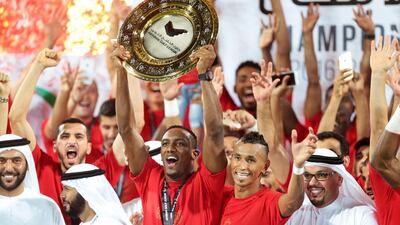The Dubai Sports Council this week announced the launch of a five-year plan to make sports and football clubs in the emirate financially independent.
The plan comes amid sustained calls for football in the Emirates to operate under stricter budgetary controls, with a number of clubs said to be encountering severe financial problems.
Following a meeting of DSC officials and attended by representatives of various clubs and football companies, including Arabian Gulf League clubs Shabab Al Ahli Club, Al Wasl and Al Nasr, the DSC laid out its vision that will see a gradual decrease in the Dubai clubs dependence on government support and the strict implementation of a zero-deficit budget plan.
Mattar Al Tayer, deputy chairman of the DSC, said the the government has provided Dubai "with the best investment opportunities in the world" in terms of tourism, business and other sectors and that all clubs had a responsibility to take advantage of them through "proper investment, effective financial budgets ... without exception".
In a stark warning to those clubs that do not comply to the DSC's five-year plan, Al Tayer warned: “The management who do not invest the resources and the name of the club optimally, they lead the club into a vortex of failures, debts and financial problems. This has become unacceptable and we will not allow these things to happen again."
Al Tayer added that through due diligence, co-operation and the application of regulations, as well as the initiatives and recommendations of the Sports Innovation Laboratory, wheels are in motion to "upgrade the sports sector to a level commensurate with the development witnessed in the other sectors of Dubai, and turn our sports sector into a model for the rest of the world.”
Although public records of football clubs' finances in the UAE are virtually impossible to obtain, The National reported in these pages in March 2017 how most clubs in the country operate beyond their means.
Hamed Alharthi, a presenter on the Dubai Sports TV show Al Manasah, painted a bleak picture of the state of AGL clubs' finances, saying many employees were going months without wages. One of the main reasons, Alharti said, were the extravagant contracts given to players, particularly foreign ones.
In a broadcast aired on December 23, 2016, Alharthi warned supporters "beware of the financial realities of your clubs, there is a financial crisis that’s knocking on the doors of our clubs. Our clubs are in a dangerous period, the clubs are facing crippling financial times. Clubs are not abiding by payments, whether to players, coaches or employees."
_____________
UAE club football’s finances need urgent attention
_____________
On the same show, Al Tayer pointed out that since the top tier of UAE football turned professional in 2008 many things, most notably the standard of football, had improved, but that now, with professionalism, "unfortunately many clubs have overreached in financial and logistical matters.”
Austerity has hit several of the country's most supported and successful clubs in recent times. In May 2017, Al Ahli, Al Shabab and Dubai Club merged to form Shabab Al Ahli Dubai Club on the orders of Sheikh Mohammed bin Rashid Al Maktoum, Vice President of the UAE and Ruler of Dubai.
Al Tayer said that a strong relationship and cooperation between DSC and the clubs were key to long-term financial stability.
“The coming period requires even more co-operation between the Council and the clubs and football companies as we work to raise the level of the sports sector in Dubai to the level of our ambitions and implement the directives of our wise leadership regards the development of the sports sector,” he said. “We need to work professionally to optimise the resources available, whether human or financial, or in terms of the available sports facilities.”

